Monthly Report - September 2025
Citizen consumer and civic Action Group (CAG), in collaboration with Solar Advisory Units of Salem, Madurai, Thiruvarur and Dindigul organised outreach meetings on rooftop solar PV systems. The Solar Advisory Unit is an initiative by CAG, comprising a solar expert and a coordinator with the aim of guiding consumers on solar system-related enquiries. The Solar Advisory Units are currently functioning in Madurai, Salem, Dindigul and Thiruvarur districts.
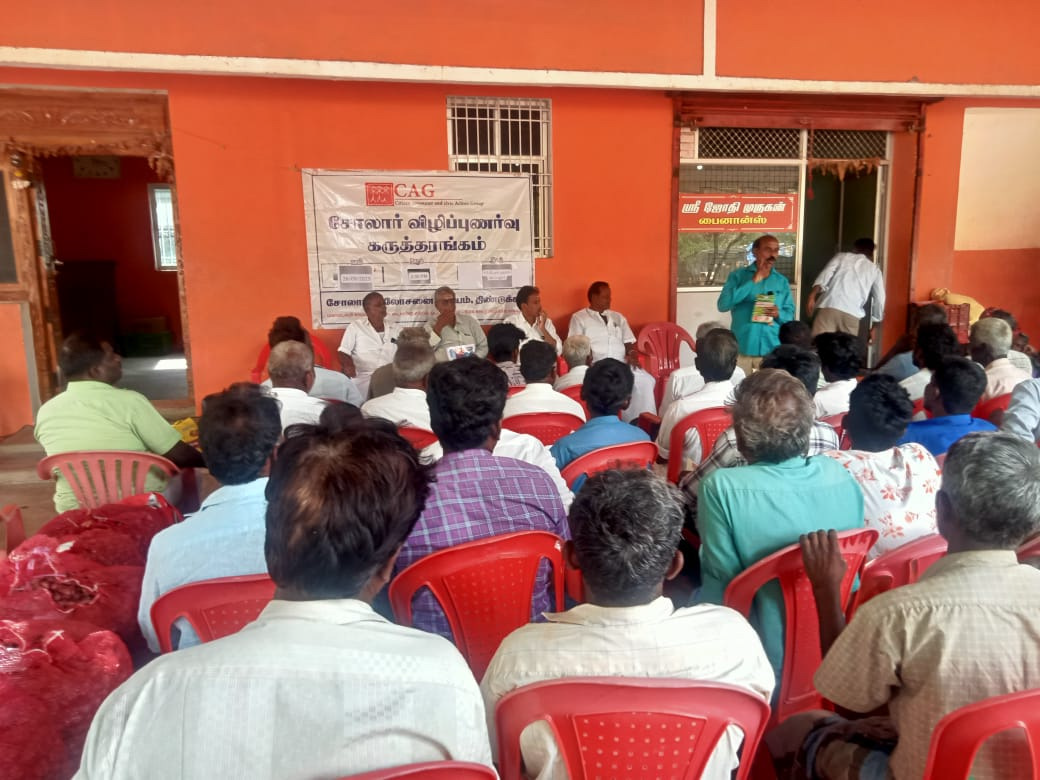
Mr. Suresh Kumar, Coordinator, Solar Advisory Unit - Dindigul,at the meeting
CAG Team gave an overview of its work and current initiatives, with a focus on raising awareness about rooftop solar energy. They shared practical insights for consumers on what consumers need to know before installing a rooftop solar system, how to select vendors, ways to grievances with vendors, and how to address concerns with DISCOM officials.
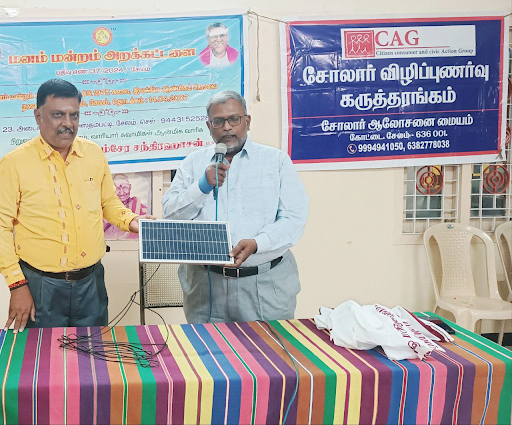
Mr. Khaja, Solar Expert, Solar Advisory Unit - Salem, during the meeting at Salem
The meetings were conducted on
- 16 September 2025 between 10 AM to 1 PM at JC Residency, Madurai, Madurai
- 24 September 2025 between 3.30 PM to 6 PM at Asoka Chakra Hall, Thiruthuraipoondi, Thiruvarur
- 26 September 2025 between 2 PM to 5 PM at K R Meeting Hall,Ayalur, Dindigul
- 27 September 2025 between 4.30 PM to 6.30 PM at Indhra Trust, Kalluthu Perumapatti, Usilampatti, Madurai
- 29 September 2025 between 6 PM to 8 PM at Santhasramam Hall ,Cherry Road, Salem
- 30 August 2025 between 4 PM to 6 PM at Surya Nagar, Madurai.
- 31 August 2025 between 11 AM to 1 PM at Ammu Mart, New Tharapuram Road, Pazhani, Dindigul
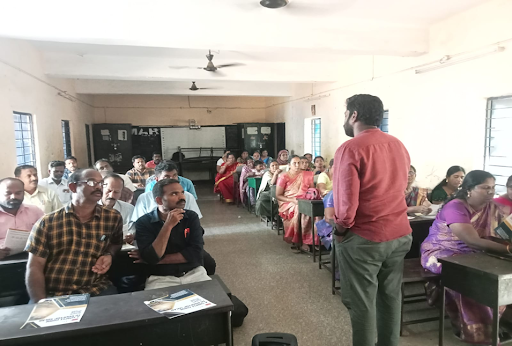
Mr. G. N. Bharath Ram, Senior Researcher, CAG meeting at Dindigul
The outreach meetings brought together a diverse group of participants, including representatives from residential welfare associations, teachers, local business leaders from commercial associations, farmers, and consumers.
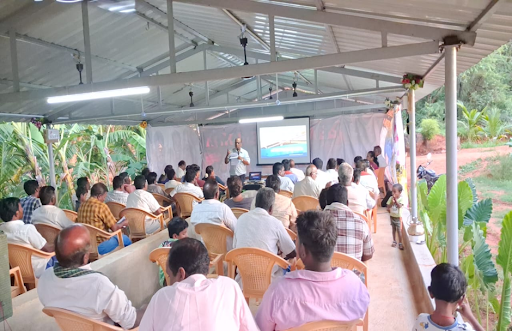
Mr. Selva Kumar, Solar Expert, Solar Advisory Unit - Madurai, explaining about the rooftop solar systems at the meeting
Further, the meetings aimed to raise awareness about solar energy, and included a comprehensive presentation on rooftop solar PV systems, covering system types, capacity requirements, space needs, investment costs, available subsidies based on tariff categories, payback period calculations, and key installation guidelines.
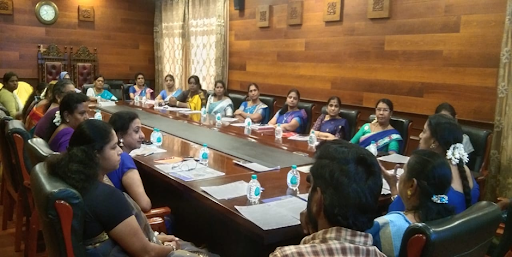
Participants during the meeting at Madurai
Participant Queries
Participants inquired about the technical and financial aspects of rooftop solar. Solar experts from the Solar Advisory units answered the queries. Key questions asked by the participants and the answers discussed are briefed below.
- A participant enquired about the time taken for the installation.
Explanation : After finalising the vendor, the actual installation of the rooftop solar system varies between 7 to 15 days, depending on the system size and the site conditions. For net metering, the time taken for approval by the distribution company (DISCOM) can vary between 7 to 14 days.
- Some participants asked about the cost of installing a rooftop solar PV system.
Explanation: The cost of installing a rooftop solar photovoltaic (PV) system varies based on factors such as system capacity, component quality, and installation specifics.
The typical cost of a 1 kW solar PV system ranges between these values:
- On-Grid system: Rs. 50,000 – Rs. 80,000
- Off-Grid system (Lead acid battery): Rs.90,000 – Rs.1,20,000
- Hybrid (Li-ion battery): Rs.1,25,000 - Rs.1,45,000
- A participant asked about space required for installation of rooftop solar PV systems.
Explanation: A 1 kW rooftop solar PV system requires approximately 60 sq.ft - 100 sq.ft of unobstructed shadow shadow-free area on the rooftop.
- A participant asked if the rooftop solar PV system has a warranty and, if so, for how many years? Explanation: A rooftop solar panel has a performance warranty of 25 years, solar panel product warranty of 10 years and inverter product warranty of 5-10 years .
- A participant asked whether solar panels are safe to touch while in operation and how were the chances of getting electrocuted.
Explanation: Solar panels are covered with a layer of glass, which acts as an electrical insulator. However, under certain conditions, such as high humidity or panel damage, minor leakage currents may still occur. Therefore, it is advisable not to touch or clean the panels during peak sunlight hours, when they are actively generating electricity. The risk of electrocution remains very low under normal operating conditions, especially when the solar PV system is installed by certified professionals, follows proper safety standards, and is equipped with effective earthing (grounding).
- Participants inquired about the maintenance and cleaning of rooftop panels.
Explanation: Proper cleaning is very important for the efficiency of the system, especially for cities like Chennai where pollution is high. Cleaning the system once a week was suggested.
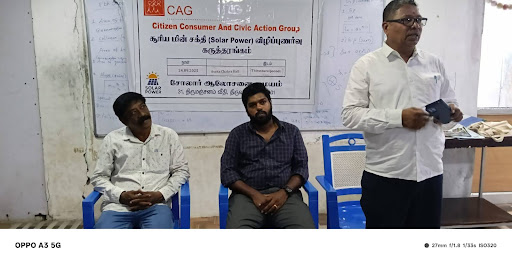
Mr. Ramesh, Coordinator, Solar Advisory Unit - Thiruvarur, during a meeting at Thiruvarur
Feedback:
Participants found the meeting to be highly useful and informative, gaining valuable insights into rooftop solar installations and expressing interest in adopting solar energy for their homes. The participants were informed about the Solar Advisory Unit, which is present in their respective districts, which will support consumers in accessing reliable information and raising grievances related to solar installations.
Solar Enquiries:
The Solar Advisory Units have guided a total of 27 inquiries, resulting in a combined solar capacity of 70 kW spread across four distinct districts. This initiative reflects a growing interest in renewable energy solutions and showcases the potential for sustainable development in each of these areas.
Add new comment